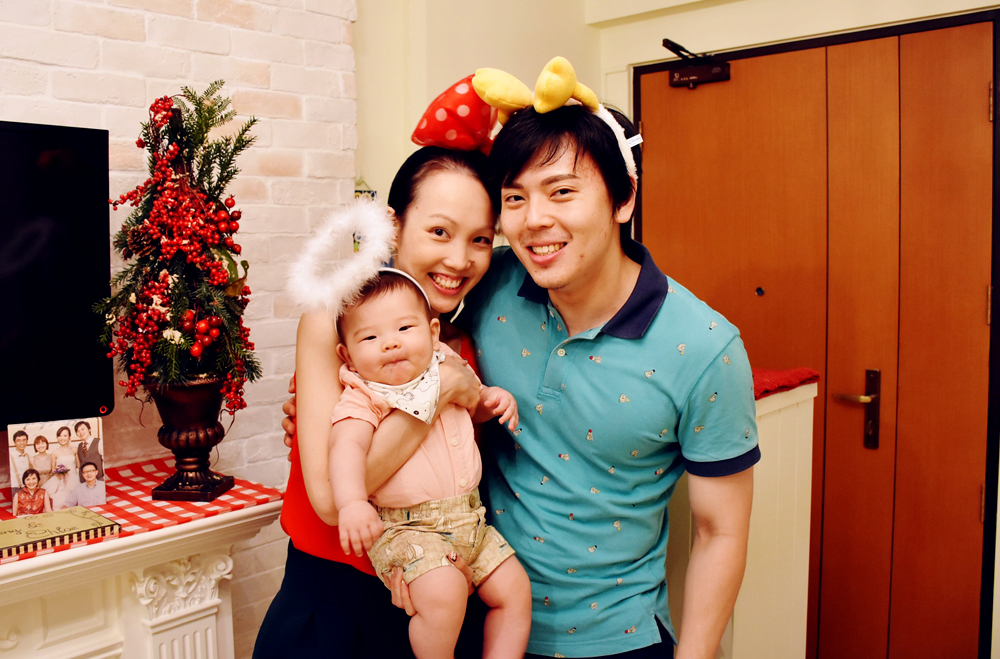She had it all planned out: get married; have two or three kids; and do this all before she turned 35. But things did not go as Phoebe Fong thought they would. However, through intrauterine insemination (IUI), she and her husband have added a bouncing baby boy – Cyrus – to their family.
IUI, alongside in vitro fertilisation (IVF), is a common fertility treatment. For IUI, the sperm sample from your partner is inserted into the uterus, close to the time of ovulation to increase the chances of getting pregnant.
In this interview, the customer experience manager shares how she overcame infertility and her journey towards pregnancy, with the help of IUI.
Why did you decide to explore fertility treatments?
My age [32] was definitely a factor. I always wanted to have a brood of two to three children, and wanted to be over and done with pregnancy by the age of 35.
Back then, this meant that I had to get pregnant within the first year of my marriage – but that didn’t happen. I was thrown a curveball as I learnt I had an ovarian cyst. I had it surgically removed and was on oral contraceptives and contraceptive injections for six months. By this time, we had already been trying for more than a year.
I was understandably frustrated and sought all means possible to get pregnant. I charted my basal body temperature and cervical discharges, followed ovulation predictors and even tried getting an appointment with a renowned TCM doctor, who had a two-month waiting list. To me, every missed cycle felt like I had one less chance to have a child.
My gynecologist brought up getting assistance and that’s when I started reading up more about possible treatments.
Was it difficult to admit that you needed help to have a child?
Definitely, there’s a lot of negativity surrounding this subject and it wasn’t easy to admit we had a problem.
I remember having a huge meltdown when I first discovered that I had a cyst. I even asked my husband if he would have still married me if we had found out before the wedding — kudos to him for being able to put up with my emotional outbursts.
Constantly trying with no results was very tiring too. The more I failed at it, the more I wanted to succeed – it was a stressful, vicious cycle.
I did meet a group of women through an online forum who were also trying to conceive. We formed a WhatsApp group to encourage one another on the journey towards seeing a positive on our pregnancy tests.
What was the consultation with the doctor like?
My first visit to the doctor was brief and to the point. We had to do a series of tests and, based on the results and my medical reports, he suggested that we give IUI a go before trying IVF. Although I had already mentally prepared myself to undergo IVF, I was happy to have a less-invasive option.
For my IUI treatment, my ovulation dates were tracked and my follicles were scanned. When I was nearing the expected ovulation date, a trigger shot was administered so that the egg would mature on schedule, and a cleansed sperm sample was injected into the uterus.
My subsequent visits were very brief, although the waiting time was sometimes stretched to an hour. My doctor was a man of very few words, but he felt very trustworthy.
What was the journey like for the both of you as a couple?
It was an emotional rollercoaster. There were many times that I would be weeping and my husband would just hold me tightly and utter a prayer to calm both of us down. I am thankful that he is level headed in such situations, and he was a huge source of comfort when I found the situation so hard.
He also played an active role while I was trying to get pregnant. Even when I suggested that he see a urologist, he gamely said yes, although I’m sure his ego must have taken a beating. He was also very reassuring during the entire process, even telling me that it would be okay if we didn’t manage to have children.
What was the most difficult part of the journey?
Dealing with failure. I was very hopeful that I would get pregnant on my very first try, given that it was such a scientific procedure. That is until I read more and realised that the chance of success was only seven per cent.
I did not take the realisation well, as, all along, childbearing had always seemed to be a natural process. Even after I had tried all ways possible, I still seemed to be heading nowhere.
I sought solace in prayer and Christian devotionals. Various infertility blogs and YouTube videos also gave me hope, as I learnt that I was not the only one having difficulty.
We were also very fortunate to have strong support from our parents who never one discouraged us from seeking help to conceive. They were there every step of the way.
Luckily for us, I got pregnant on my second IUI attempt.

What was it like when you finally learnt that you were pregnant?
Even though I was overjoyed, I didn’t have much time to process it as, once I learnt I was expecting, I was asked to take all sort of pills and jabs. I had a few brushes with ‘threatened abortion’, was put on a hospital ward for palpitations and given eight weeks of bed rest. Others would be dealing with morning sickness during their first trimester but, for me, I was praying and hoping that I would be able to keep my baby. All I did was lie in bed, only sitting up during meal times.
It was only much later in the pregnancy — around the middle of my second trimester — that it finally sank in that I was pregnant.
What were the costs for your IUI treatment?
As IUI is an assisted conception procedure, as long as you are a woman under 39 years old, you can tap into your Medisave account. I went to a government hospital and each IUI treatment cost about S$1,000, which we were able to claim in full.
Do you feel that assisted conception should be more widely talked about and what advice do you have for other women who considering getting help?
There definitely should be more conversation regarding assisted conception. If it is kept as a ‘hush-hush’ topic, it only makes the process more stressful. There are plenty of women who yearn for a child and they perhaps put the brakes on getting help because of the social stigma and fear of the assisted conception procedures.
If you are thinking of seeking help, get checked first before planning your next step. Personally, I would suggest doing it early as it was difficult enough going through everything at this age, and I cannot imagine what it would be like if I only did it much later in life.
Phoebe Fong blogs about her life, including her journey to getting pregnant and the daily antics of her son, at The Marriage Chapter.



